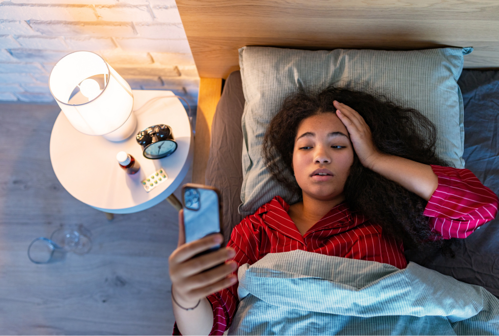How to Tell If Stress Is the Culprit Behind Your Sleepless Nights
April 2, 2025
Published in:
Many entrepreneurs struggle with sleep, but the fix may be simpler than you think. A neuropsychologist addresses five key questions to determine whether stress, habits, or overlooked factors are the true culprits—and how to fix them without resorting to expensive interventions.

As we recognize International Stress Awareness Month in April, we asked EO Arizona member Dr. Amy Serin, a neuropsychologist specializing in stress management, author of The Stress Switch, and founder of Serin Center, what she recommends for her patients who struggle to develop and maintain healthy sleep patterns.
Sleep. It is so important that even one night of tossing and turning can ruin our mood, increase anxiety, lower cognitive function, and tank performance the following day. Chronic sleep problems can lead to mental health issues and degenerative disorders. Most of us understand that sleep is critical for a healthy, productive life. So why do so many entrepreneurs struggle with sleep? And why, when we spend over US$500 billion a year on sleep, is it still so difficult?
It pains me to see people wasting their time and money as they embark on elaborate schemes to simply get to sleep. There are so many purported (and expensive) fixes out there, it’s no wonder that even the savviest consumer is confused about what to try — or not to try — to get sleep back on track.
Let’s get pragmatic. Here are five questions to ask yourself when considering what to do about sleep.
1. Is it a sleep problem or a stress problem?
Your parasympathetic nervous system (also called the “rest and digest” nervous system) must be in charge for your body to enter a state of sleep. If you’re an entrepreneur who is always “on,” you may simply be too activated with stress to enter a state of sleep. The fix may be as easy as de-stressing yourself with neurotechnology before you go to sleep, or training your brain to be more flexible so it can access the right state at the right time.
Meditation apps, calming media content, music, and binaural beats can also be helpful. A word of caution: If you are using devices before sleep, you may be unknowingly disrupting sleep with light. Don’t let the false promise of “sleep mode” fool you. There is still enough light in this mode to disrupt sleep. Lamps, overhead lighting, alarm clocks, and even lights on air purifiers or other gadgets are enough to trick your brain into thinking it is daytime and suppress melatonin.
Pro tip: Try orange, blue-blocking glasses that shut out enough blue spectrum light that you don’t have to obsessively block out all sources of light from your environment.
2. Are you stressing yourself out about sleep?
Don’t be counterproductive in your quest for sleep. If you track your sleep, avoid becoming obsessive, and ensure that you have ways to improve your sleep. Data without change may just add more stress, rather than allowing for the calm state necessary for sleep to happen.
Remember, your body wants to sleep. Sleep is a natural state. If your brain and body are regulated, your body will naturally be able to sleep unless there is an underlying medical disorder or issue. For many of us, stress is the culprit that needs to be dealt with first. My patients often start yawning during therapy because their bodies finally relax enough to be able to feel tired. As soon as we lower stress enough, the body’s natural rhythm and needs emerge.
3. Are factors other than stress impeding your ability to get sleep?
Artificial light, noisy environments, hormones, a new environment, caffeine, alcohol, lack of exercise, heavy spicy meals before bed, or a snoring partner can all affect the quality of your sleep. Sometimes simple behavioral changes, tips, or tricks can improve your quality of sleep significantly.
4. Are you considering an expensive or invasive fix without addressing what might be more common or obvious?
I’ve seen people who buy over $50k of cold plunge baths, sleep sound machines, and smart mattresses yet still lay awake every night red-eyed and frustrated. No amount of sleep gadgetry can override a brain that is in a state of fight/flight or hyperarousal. A pragmatic approach is to look at the potentially obvious causes first and address them in ways that will produce a significant effect.
For example, if someone experiences a traumatic life event and suddenly their sleep is disrupted, even after they are through the worst of it, poor sleep may linger as the brain’s new default. Addressing the trauma with a therapy such as EMDR (eye movement desensitization and reprocessing) can effectively reset the brain and restore sleep naturally.
5. Are you using a “fix” that has other consequences or side effects?
I love it when my patients ditch their sleeping pills. I understand the desperation to sleep, and yet chemical “fixes” are usually temporary Band-Aids at best, with potentially harmful side effects and addiction potential. Whenever there’s a non-chemical solution, I try that first. There are risks and quality control issues even with over-the-counter medication. A recent study showed an alarming problem with the quality of melatonin supplements. When tested, they had a range of −83 percent to +478 percent of the melatonin dose reported on the label.
Except for cases of undiagnosed medical issues, like sleep apnea or neurological problems, we can usually fix the sleep problem efficiently without medication. The next time you’re desperate for some sleep, remember: It’s possible that your sleep problem is a stress problem, and the antidote may not be as complicated as you think.
This post first published on EO’s Inc.com channel.